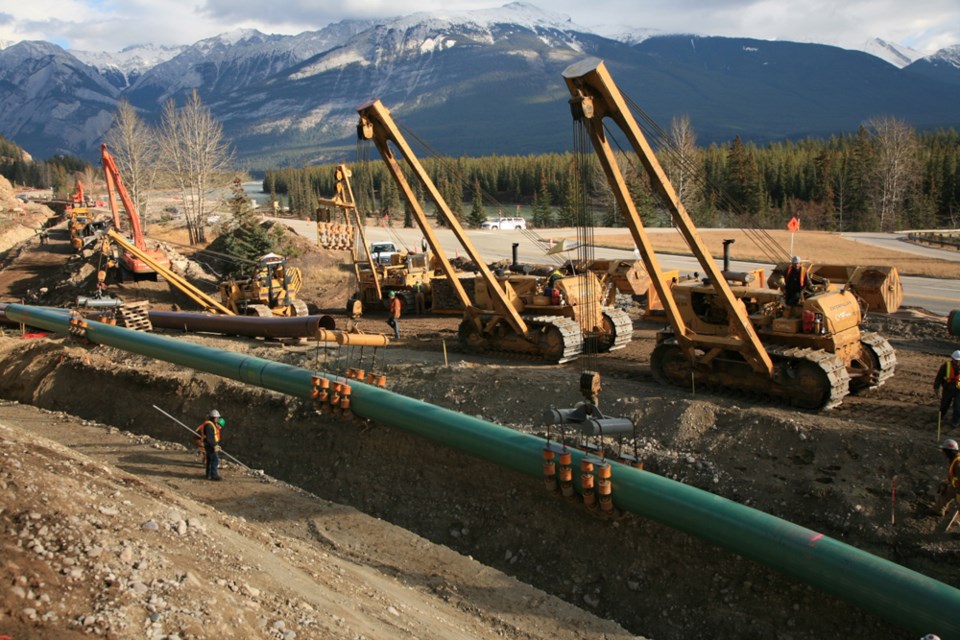Kinder Morgan Canada tried to bully the City of Burnaby, according to Mayor Derek Corrigan.
Corrigan said Ian Anderson, the company’s president, stopped by his office on Wednesday “to complain” about the permitting process around the $7.4-billion Trans Mountain expansion project.
He told the NOW Anderson put pressure on him “to do something.”
“I explained to him that I can’t interfere. ... It’s a regulatory function,” the mayor said. “He was disappointed. He basically told me he was going to go to the NEB, and I said, ‘Well, you’ve had success there on almost every occasion. I’m not surprised you’re going there, but I don’t see any reason for the National Energy Board to intervene. Our staff are doing their job.’”
An interview request with Anderson has yet to be returned.
The next day, Oct. 26, the Texas-based company announced it has asked the NEB to proceed with construction in Burnaby without local permits.
In a statement, Kinder Morgan said it spent “many months” working “in good faith” to obtain municipal permits – efforts that were “without success.”
“The city’s failure to act in a timely manner raises serious issues of jurisdiction that we are compelled to bring to the board’s attention,” read the statement.
Kinder Morgan said its doors remain open to the City of Burnaby and it “would welcome the opportunity to discuss a solution.”
The twinned pipeline would carry bitumen from Edmonton to Burnaby at nearly three times the pipeline’s current capacity. The project has faced fierce opposition from First Nations groups, the cities of Burnaby and Vancouver, environmental organizations and the provincial government.
The pipeline is scheduled to be up and running by December 2019, but if it gets pushed back, the company stands to lose between $30 and $35 million each month the project is delayed, according to an affidavit from Michael Davies, Kinder Morgan’s vice-president of operations.
Loss of revenue “is likely to exceed” 90 million each month.
In an email to the NOW, the NEB’s James Stevenson said Kinder Morgan’s request is under review and the national energy regulator will take the time it needs “to make the right decision.”
Corrigan maintained city staff have to do their “due diligence” when approving permits.
He refuted a statement made in Davies’ affidavit that referenced a National Observer story, which claimed “the mayor believed the permitting process was a legitimate method of slowing down the project.”
“The National Observer contacted me to tell me that the affidavit misquotes them. I have never said something like that, and I’ve never indicated that,” he said. “I’m a lawyer. I understand exactly what we’re doing, and I’ve been in this job for a long time, so that kind of allegation is just mischievous.”
If the NEB grants Kinder Morgan’s request, the mayor said it could set a very dangerous precedent.
“It would be one in which the province would be forced to respond. The federal government would be put in a tremendously awkward position if the NEB felt they could walk in and start interfering with local government processes and overruling them simply because of allegations made by the proponent that this wasn’t moving as quickly as they wanted it to.”
Corrigan added the city is prepared to take legal action if the NEB gives Kinder Morgan the go-ahead for construction.
“I would expect our MPs will be taking it up in the House of Commons. I can’t see that the provincial government won’t have to enter and protect the integrity of our municipal processes because they’re a result of provincial statutes,” he explained. “This isn’t going to be comfortable for Kinder Morgan. They’re bullying, and I’m not prepared to accept that. Our staff have to be able to protect the interests of our community, and they have to protect the ecology of the conservation areas and parks that (the pipeline’s) moving through.”



